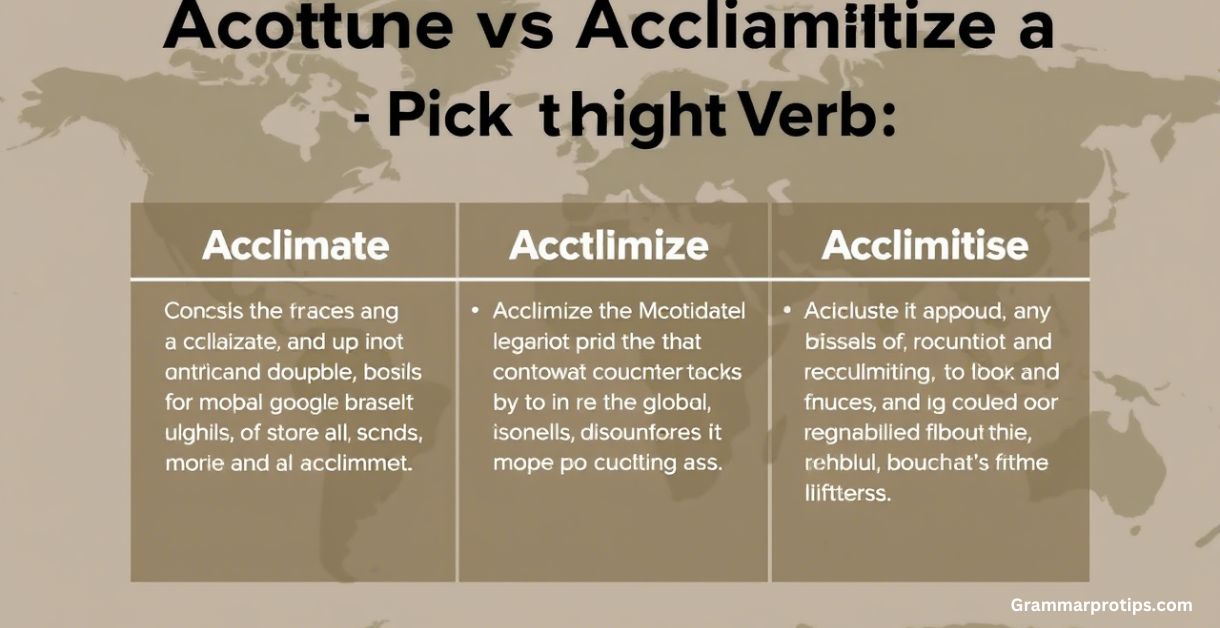Introduction
When adapting to new surroundings, you may hear the words acclimate, acclimatize, or acclimatise being used interchangeably. However, there are important distinctions between them based on regional language differences, scientific vs casual usage, and spelling variations.
This article explores these terms in-depth, providing acclimation vs acclimatization examples to help you choose the right verb in different contexts.
Acclimate vs Acclimatize vs Acclimatise: What’s the Difference?
The difference between these three words lies mainly in British vs American English and spelling preferences in different regions. Here’s a breakdown:
| Term | Meaning | Usage Context | Common in |
|---|---|---|---|
| Acclimate | To adjust to a new environment or condition, often in a casual sense | Commonly used in everyday speech | American English |
| Acclimatize | To undergo a process of adapting, often in scientific or formal settings | Preferred in technical and academic contexts | British & American English |
| Acclimatise | British spelling variant of “acclimatize” | Same as “acclimatize” but follows UK spelling rules | British English |
Acclimate: The Casual Adjustment

The verb acclimate is frequently used in American English to describe adjusting to new environments in an informal or general sense. This can relate to workplace transition, climate adaptation, or even adjusting to a new lifestyle.
Examples of Acclimate in Sentences:
- It took Sarah a few weeks to acclimate to her new office’s fast-paced environment.
- Tourists often struggle to acclimate to the humidity in tropical countries.
- After moving from New York to California, James had to acclimate to the laid-back culture.
Email Example for Acclimation:
Subject: Assistance in Acclimating to Our Company Culture
Dear Jessica,
Welcome to the team! We understand that starting a new job can be challenging, and we want to support your workplace acclimation process. Please feel free to reach out if you need any guidance while you acclimate to your new role. Looking forward to working with you!
Best regards,
Michael Thompson
HR Manager
Acclimatize: The Scientific and Formal Approach
The word acclimatized vs acclimated reveals a crucial distinction: acclimatized is often used in scientific, technical, or formal discussions about adjusting to climate changes or environmental shifts.
Examples of Acclimatize in Sentences:
- Climbers must acclimatize to high altitudes before attempting to summit Mount Everest.
- Scientists study how marine species acclimatize to temperature shifts due to global warming.
- Employees moving to overseas offices may take time to acclimatize to new business cultures.
Email Example for Acclimatization:
Subject: Helping You Acclimatize to Your International Assignment
Dear Jonathan,
As you prepare for your relocation to Tokyo, we have arranged for cultural training sessions to help you acclimatize to the new work environment. If you need any assistance during your workplace acclimation process, let us know. Safe travels!
Best,
Emily Carter
Global HR Coordinator
Acclimatise: The British English Variation

For those following American vs British spelling, acclimatise is simply the UK English spelling of acclimatize. It carries the same meaning but aligns with spelling preferences in different regions.
Examples of Acclimatise in Sentences:
- After relocating to London, Thomas had to acclimatise to the city’s cooler climate.
- The researchers observed how local wildlife acclimatised to environmental changes.
- International students often take time to acclimatise to the British education system.
Workplace Acclimation Process Example:
If you are starting a new job in the UK, you might receive an email like this:
Subject: Helping You Acclimatise to Your New Role
Dear Rachel,
Welcome aboard! We understand that adjusting to a new job takes time. To help you acclimatise to our work culture, we have scheduled an onboarding session for next week. Let us know if you have any questions!
Best wishes,
Daniel White
HR Coordinator
Acclimation vs Acclimatization: Which One to Use?
The nouns acclimation and acclimatization follow the same pattern as their verb forms.
- Acclimation – More common in American English, used in casual contexts.
- Acclimatization – Preferred in British English and formal/scientific contexts.
Acclimation vs Acclimatization Examples:
- The acclimation period for new employees usually lasts two weeks.
- Scientists study the acclimatization of crops to extreme weather conditions.
- After moving from Texas to Alaska, Jake’s acclimation to the cold took months.
Adjusting to Climate Changes and Time Zones

People often need to adjust to climate changes when traveling or relocating. Similarly, time zone adaptation is another challenge for frequent travelers and remote workers.
Examples:
- Maria struggled with time zone adaptation after moving from New York to Sydney.
- Pilots and flight attendants must develop strategies for adjusting to climate changes and jet lag.
- The environmental adjustment of migratory birds is a fascinating phenomenon in biology.
Final Thoughts: Picking the Right Verb
When choosing between acclimate vs acclimatize vs acclimatise, consider:
- Casual vs formal usage – Use acclimate for casual settings and acclimatize/acclimatise for scientific or formal discussions.
- American vs British spelling – Stick to regional norms (acclimate in the US, acclimatize/acclimatise in the UK).
- Context-specific meaning – Consider if you’re talking about climate adaptation, workplace transition, or environmental adjustment.
Now that you understand the difference between acclimate and acclimatize, you can confidently use the right verb in professional and everyday conversations. Need help crafting an email? Just pick the most suitable form for your audience!

“Smith is the dedicated admin of [grammarprotips.com], a platform focused on enhancing grammar skills. With a passion for language and education, Smith strives to make grammar accessible and enjoyable for learners of all levels. Committed to delivering high-quality content, Smith continually explores innovative ways to help users master the complexities of grammar.”


bdjdse
6xqipw
zla4ke
xiaf7c